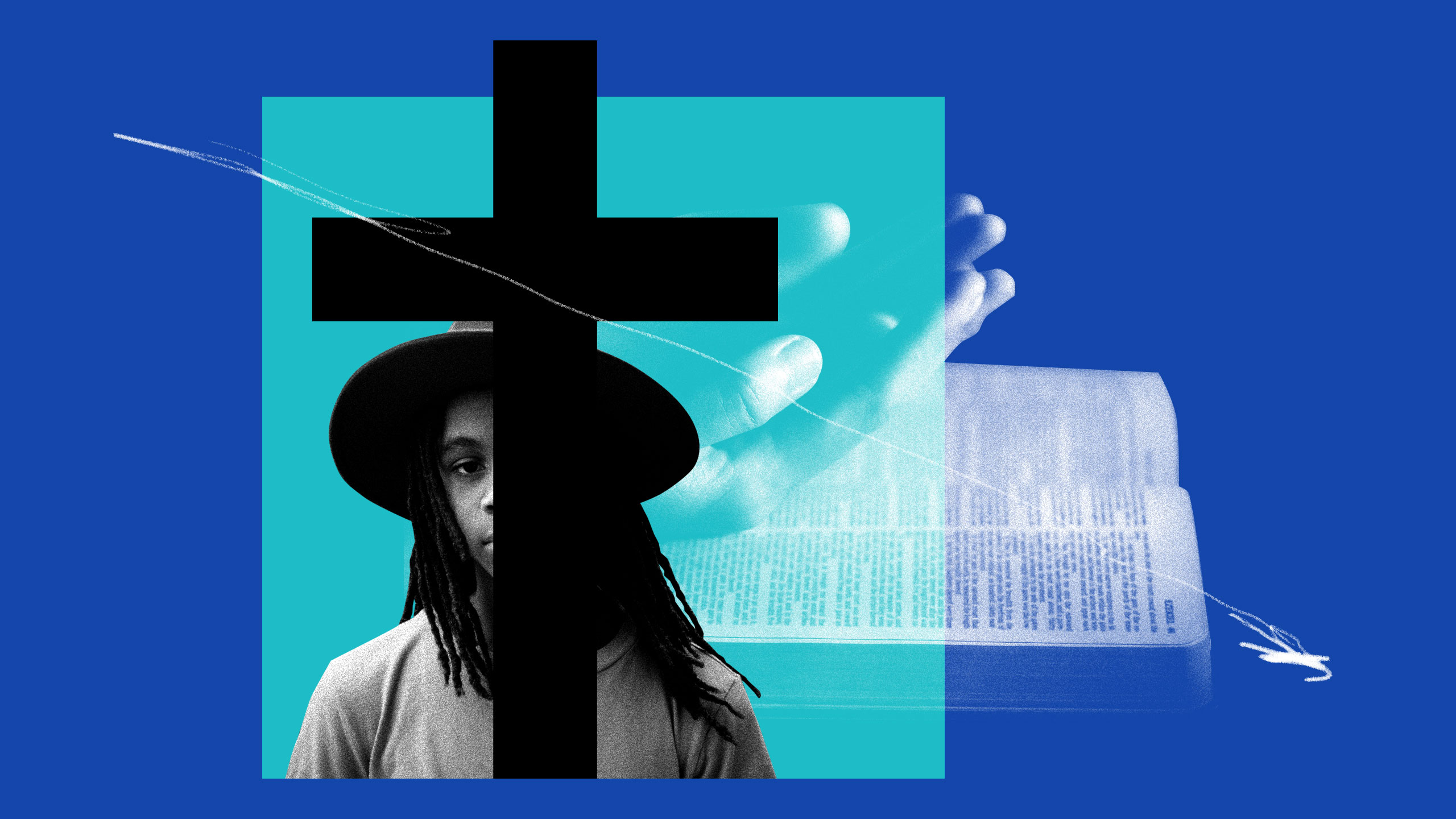Growing up, Keturah Johnson felt like she couldn’t escape the watchful eyes of her community.
“You’re always being looked at with a magnifying glass, you’re always being looked at and checked up on,” she says. Now an American Airlines flight attendant living in Philadelphia, Keturah grew up in between cultures—not only because she was discovering and exploring her own sexuality, but also because of her parents’ work as Christian missionaries.
“I was afraid to come out because of the questions [the church] would ask my parents,” she says.
Keturah’s parents moved to Bomet, Kenya, in the 1990s, where they worked at Tenwek Hospital. As is the case with many missionaries, Keturah’s parents’ work was funded and paid for through donations from members of their home church in the U.S., a relationship that can put queer and trans kids in an uncomfortable position.
“I didn’t have a lot of friends on Facebook because I was so afraid of what they would think… the fear is that they are questioning your parents’ work, right? Like, ‘How can your parents be missionaries and have a kid who is in the LGBTQ+ community,’” she says. “That’s how I looked at it before.”
Johnson’s experience is not unique; in fact, homophobia and transphobia have historically been recurring themes in the world of overseas Christian ministry. Several Indigenous groups in sub-Saharan Africa had progressive views on sexuality and gender identity prior to the arrival of Christianity in the region. One of the 19th-century kings of the Buganda, in what is now the Republic of Uganda, was a bisexual man who ruled undisturbed before being exiled by early Christian missionaries. Colonial homophobia is still happening in Uganda today, which has some of the most draconian anti-queer legislation in the world. Many of the country’s most brutal laws have emerged in the last decade and were engineered by Scott Lively, an American former evangelical pastor and anti-gay activist.
“It’s harder to come out as a missionary kid or a pastor’s kid because you have this expectation to follow in the Lord’s footsteps.”
Caught in the crosshairs are the LGBTQ2S+ children of missionaries. “Missionary kids,” as they are affectionately known, often grow up outside of their home culture and can become deeply connected to both their parents’ ministry and the wider missionary community. For queer missionary kids, this insulation can be suffocating long into adulthood.
“It’s harder to come out as a missionary kid or a pastor’s kid,” Johnson says, “because you have this expectation to follow in your family’s footsteps, or in the Lord’s footsteps.”
“I wanted to feel free”
For Johnson, coming out was about finding freedom. “I wanted to be free and I felt I couldn’t be my true self if I was holding all that stuff inside of me,” she says. “It’s miserable. You talk about depression and anxiety and hiding someone who you aren’t, it’s frustrating and it’ll eat you up.”
According to a recent study from the Journal of Cross-Cultural Psychology, children who grow up outside of their parent’s culture suffer disportionately from depression, isolation and a lack of belonging. Missionary kids often cling to churches to find community, but evangelical churches are not particularly known for being an accepting place for people to explore their sexuality and identity.
Johnson first came out to some of her closest friends when she returned to Kenya for a class reunion a couple years after graduating from high school. But it wasn’t until July 2020 that she came out publicly when she appeared on an episode of The Coming Out Chronicles and shared her story. The podcast, hosted by Calgary coming-out coach and former missionary kid Nancy Shadlock, gave Johnson the space to feel liberated.
“It was the first time I shared my coming out story on social media,” Johnson says. “It was received really well, it was just me telling my story coming out as a missionary kid and a woman of colour.”
Finding and seeking community
Shadlock, too, experienced the hardships of coming out after growing up as a missionary kid. She often worried: “Am I going to lose my whole family? My whole friend set? Is everyone going to push me away?”
Shadlock’s parents worked in Baringo County, Kenya, among the Pokot people, while Shadlock attended a boarding school in Kijabe called Rift Valley Academy (RVA). After graduating from high school, she attended Briercrest seminary in Saskatchewan and worked as a youth pastor for a few years. “I didn’t love the ‘rah rah’ fun and games of youth ministry, I just liked the conversations,” she says.
Disgruntled with youth ministry and not sure where her life was headed, Shadlock took a pilgrimage across North America in 2008 in hopes of finding direction in her life. “I visited my friends from RVA and I would ask them, ‘Who is wise in your life?’ and I would go and talk to them.” One of the people Nancy spoke to was a pastor who told her that if she just liked the conversational part of being a pastor then she should just do that. “It was this thing called ‘spiritual direction’: you sit with someone and pay attention to what is going on in deep places, particularly in their spiritual life,” she explains.
“Am I going to lose my whole family? Is everyone going to push me away?”
But during all of this Shadlock was still living in the closet. “It got to this point where I was like, I’m helping people listen to the deepest part of themselves, but I am ignoring this one part of myself that is still in the closet,” she says. “I finally came out at age 34 and started to live more of my authentic self.
Still, Shadlock is not entirely sure that she knows where she belongs. “I moved from [Vancouver’s] Commercial Drive, which I would say is the lesbian capital of Canada, to conservative Calgary. And that’s where I came out,” she says.
There was something special about her church community back in Vancouver, something that Shadlock has struggled to rekindle since moving away. “There was a queer church that started up in Calgary around the time that I came out, so I went there a few times,” she says. “It wasn’t exactly the spirituality that I loved, but I was like, ‘Where else are you going to meet the thoughtful lesbians?’ So that is where I met my wife.” Shadlock has now been married for five years and has two children.
As a coming-out coach, Shadlock mostly works with women and non-binary folks between the ages of 30 and 50 years old. Most of her clients come from a Christian background and some of them come from missionary families themselves.
“Coming-out coaching is helping people have support and accompanying them on their journey,” she says. “Being able to be that steady presence for people, so that they know that they are not alone, cheering them on to keep listening to their deeper truth and then living from that.”
In addition to her podcast and coaching, Shadlock also runs The Shift Retreat, a three-day program that aims to help people come to terms with and contextualize their sexuality and gender identity.
Reshaping our society
Both Shadlock and Johnson’s experiences are common, according to Tanya Erzen, an associate research professor of religion and gender queer studies at the University of Puget Sound in Washington. Erzen has published several books on the intersections of religion, capitalism and queer identity.
“Your entire worldview, your social world, your cultural world, everything you know is through the church,” she says. “If you grow up with the message that your sexuality and your religion are incompatible… then they experience what they would describe as this intense conflict that feels like these two really central parts of your identity are irreconcilable.” Erzen adds that this conflict is even more extreme in a missionary setting.
“Religious spaces do [have] this important role though, right? They give you community, people you can call, tangible social support like child care… but it’s only for people who believe,” Erzen says. “Why does it have to be just for people who convert? And how can we start to imagine other spaces like this that aren’t based on a religious identity?”
“Religious spaces give you community, people you can call… but it’s only for people who believe.”
Since more missionaries come from the U.S. than any other country in the world, the culture of overseas ministry is closely linked to the culture of right-wing, evangelical America. And while there has been social progress made within both missionary organizations and their supporting churches, there has not been an uprooting of systemic homophobia and transphobia. The world, on the other hand, has changed significantly and social media offers narrow, yet important tool for queer missionary kids.
There is no one all-encompassing organization that can give every queer missionary kid the community they are looking for. There is, however, a wide network of people all around the world from which one can begin to piece together their own community, a little from here and a little from over there. Erzen, Shadlock and Johnson, for instance, all agree that social media provides at least some semblance of a safe community. It is a way to connect and form bonds that the older generation of LGBTQ2S+ missionary kids never had.
After she came out, Johnson started a Facebook group for the “queer and ally” alumni from her missionary high school. “It was so encouraging to me,” she says, to see missionary kids ranging across all generations and hailing from every corner of the world. “We all had the same stories,” Johnson says. “We just never had a space to talk.”
Linked below are online resources for LGBTQ+ missionary kids, Christians and ex-Christians in Canada.
Mennonite Church of Canada (some congregations)


 Why you can trust Xtra
Why you can trust Xtra


